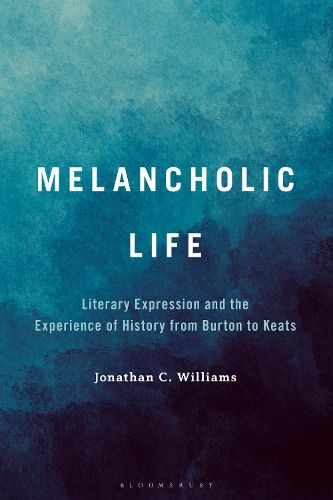Readings Newsletter
Become a Readings Member to make your shopping experience even easier.
Sign in or sign up for free!
You’re not far away from qualifying for FREE standard shipping within Australia
You’ve qualified for FREE standard shipping within Australia
The cart is loading…






A study of how 18th-century British literary writers deployed melancholic feeling to draw a complex web of relations between the embodied self and its historical present.
Melancholic Life argues that what binds 18th-century melancholics such as the speaker of James Thomson, Sarah Fielding's David Simple, or William Cowper is a belief that critical thought is worth voicing whether or not it contributes to social change. That belief converges with 18th-century ideas of sentiment and loneliness, but it also syncs up in surprising ways with theoretical models of political subjectivity that emerge in the 20th and 21st centuries.
Jonathan C. Williams thus proposes a new way of thinking about the critical importance of literary melancholy in the 18th century: as the language of melancholic social criticism, a solitary protest against exploitative features of social life, including global commerce and print capitalism. That form of melancholic life helps to trace a genealogy from Robert Burton's Democritus to Defoe's Crusoe to the Romantic period; it also yokes the early capitalist historical moment of Mackenzie's The Man of Feeling to the post-1968 modernity that characterizes the work of Theodor W. Adorno.
As Melancholic Life shows, melancholic social criticism persists even when there is little hope. That spirit of persistence becomes a condition of literary expression in the 18th century. Attention to melancholic expression reveals resonances not only to medical, religious, poetic, and philosophical language, but also between 18th-century thinkers and your own historical moment.
$9.00 standard shipping within Australia
FREE standard shipping within Australia for orders over $100.00
Express & International shipping calculated at checkout
A study of how 18th-century British literary writers deployed melancholic feeling to draw a complex web of relations between the embodied self and its historical present.
Melancholic Life argues that what binds 18th-century melancholics such as the speaker of James Thomson, Sarah Fielding's David Simple, or William Cowper is a belief that critical thought is worth voicing whether or not it contributes to social change. That belief converges with 18th-century ideas of sentiment and loneliness, but it also syncs up in surprising ways with theoretical models of political subjectivity that emerge in the 20th and 21st centuries.
Jonathan C. Williams thus proposes a new way of thinking about the critical importance of literary melancholy in the 18th century: as the language of melancholic social criticism, a solitary protest against exploitative features of social life, including global commerce and print capitalism. That form of melancholic life helps to trace a genealogy from Robert Burton's Democritus to Defoe's Crusoe to the Romantic period; it also yokes the early capitalist historical moment of Mackenzie's The Man of Feeling to the post-1968 modernity that characterizes the work of Theodor W. Adorno.
As Melancholic Life shows, melancholic social criticism persists even when there is little hope. That spirit of persistence becomes a condition of literary expression in the 18th century. Attention to melancholic expression reveals resonances not only to medical, religious, poetic, and philosophical language, but also between 18th-century thinkers and your own historical moment.